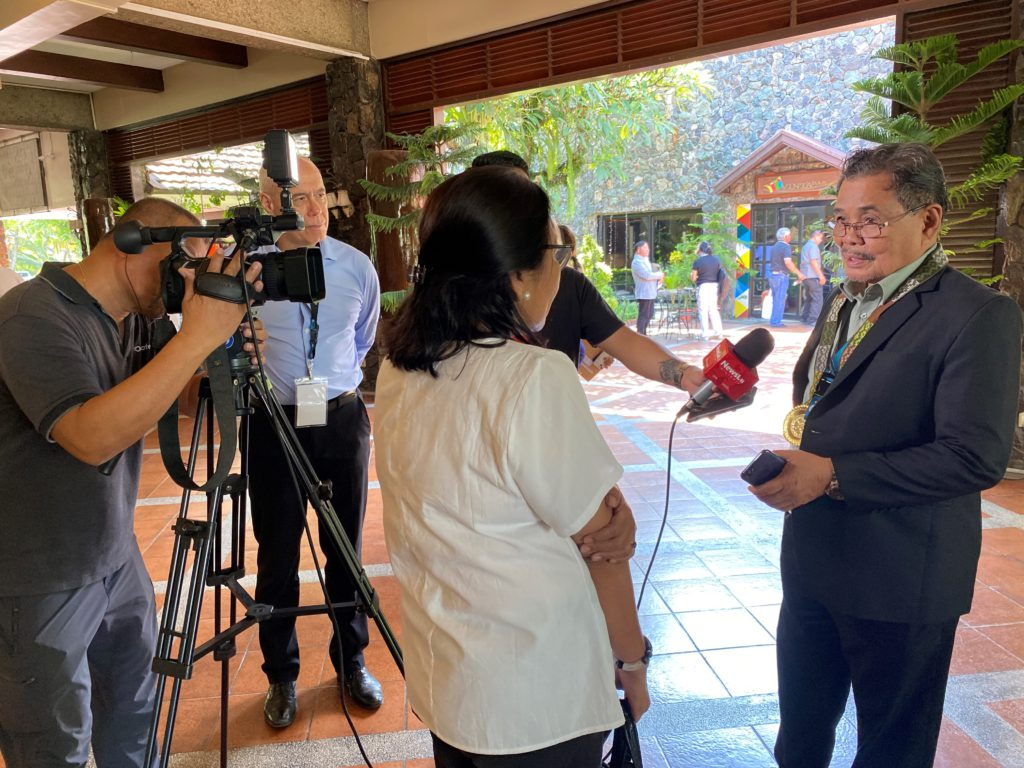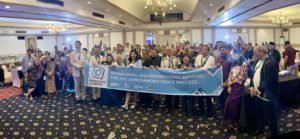
‘Maratabat is dignity that remains Bangsamoro unconquered and continue its struggle today’ – Iqbal

DAVAO CITY (July 13, 2023) – “Maratabat is dignity that remains Bangsamoro unconquered and continue its struggle today,” said Mohagher M. Iqbal, Chair of Peace Implementing Panel of the Moro Islamic Liberation Front (MILF) in his speech during the Launching Program of Principles for Peace (P4P) with a theme “Reimagining and Re -energizing Support for the Bangsamoro Peace Process,” held at Waterfront Insular Hotel, this city on Wednesday, July 11.
The event was organized by the Geneva – based Principles for Foundation, Global Partnership for the Prevention of Armed Conflict (GPPAC) and its secretariat, Initiatives for International Dialogue (IID), International Center for Innovation, Transformation and Excellence in Governance Inc. (INCITEGov), and Gaston Z. Irrigate Peace Institute (GZO).
“Dignity is the reason why we struggle,” Iqbal, also the Minister of Basic, Higher and Technical Education (MBHTE) of the Bangsamoro Autonomous Region in Muslim Mindanao (BARMM), emphasized.
He added, “Historically, the denial of the dignity of the Bangsamoro People throughout history and until today is the undercurrent that sustains the continuing conflict in Mindanao.”
“The revolutionary struggle of the MILF and of course of the MNLF is in response to this denial of dignity by Spain, the Americans, and the Filipinos. This denial of dignity has been ongoing for hundreds of years and continues today,” he explained.
According to Iqbal, the revolutionary struggle is a claim to the Bangsamoro’s birthright to dignity “to be treated as a people that is valuable, important, and equal to the Filipino.”
He said, “We demand parity of esteem. Even today, as I speak, you know that there is still no parity, and when there is no parity, the problems will persist.” He also related how the Bangsamoro people have struggled sacrificing everything they have – on their faith, for their lives, for their youth, and to their dreams.
The MILF implementing panel chair said, “When people recognize the dignity of others, they open up themselves to a world of possibilities. They can build bridges of understanding and cooperation. They can create a society where everyone can reach their full potential.”
“But when people deny the dignity of others, as they have done to the Bangsamoro People for hundreds of years, they sow the seeds of division and conflict,” Iqbal said.
To address such concern, he underscored, “The solution requires transitional justice and reconciliation, accountable policing, amnesty, and others. This leads to both parties from the implementing panels shall complete the normalization process before completing the decommissioning process.”
He believes that the solution to the problem is not just through decommissioning the arms and armies of the Bangsamoro, not even putting resources to the beggar bowls in terms of socio – economic programs, neither establishing the BARMM regional government nor to recognize the Bangsamoro people as equal and parity with the Filipino People.
Iqbal urged the civic groups, representatives from different agencies and offices, non-government organizations and international communities, the BARMM officials from the Bangsamoro Transition Authority including the media entities to open their minds and hearts, citing, “Between the Bangsamoro and the Filipinos it is not difficult to see the benefits of parity.”
He further conveyed his suggestions as follows:
1. Promote peace and understanding. Dignity and parity can create an atmosphere of trust and cooperation. This can help to prevent conflict and promote peace in the region, especially against armed extremists.
2. Enhance equality and opportunity. We can create a society where everyone can succeed. This means that no one is excluded from the benefits of society based on their race, religion, gender, or social status.
3. Protect human rights. We protect human rights. This means that we will not tolerate discrimination, violence, or exploitation.
The MILF implementing panel chair said that Maratabat is a concept deeply ingrained in the Bangsamoro cultures. He said that in other cultures, particularly in Southeast Asia, they have Maratabat which are often misunderstood and misrepresented in popular perception.
“Commonly translated as valor or honor, Maratabat is typically associated with revenge, conflict, and violence,” Iqbal elucidated.
He further emphasized that on the common perception that “Maratabat” is wrong or does not cover the entire picture, it overlooks the value of Maratabat to be a force for good and contribute to peacebuilding efforts within societies.
He said, “Maratabat is dignity and in itself it is an honor system, sometimes it is hierarchical.”
“While public perception only looks at Maratabat at the level of individual or family dignity and honor, however, Maratabat is a framework for social order, cohesion, and action in many of our communities,” Iqbal further explained.
He added, “It provides individuals with a sense of identity, belonging, and purpose within their social structures.”
The MILF implementing panel chair continue to affirm that “by adhering to the principles of Maratabat, individuals are motivated to conduct themselves in ways that align with the values and norms of our society, promoting social harmony and stability.
“And this adherence to Maratabat can still and instill a sense of accountability and responsibility as individuals strive to maintain their honor and reputation within their communities,” he continued.
If only then Maratabat is properly understood and channeled, then it can also facilitate conflict resolution and promote peace, according to the education minister. He further pointed out that, “Maratabat can be a catalyst for positive social change and development.”
“A community should uphold the values of prioritize collective well-being and the betterment of society. This emphasis on communal welfare can lead to initiatives such as community-driven development projects, education programs, and social support networks,” Iqbal underscored.
He added, “By harnessing the positive aspects of Maratabat, communities can mobilize their resources and collective efforts toward the pursuit of social progress, peace, and justice.”
The MILF implementing panel chair said that it is essential to acknowledge that Maratabat, like any cultural concept, is not immune to abuse or misinterpretation.
He believes that the misapplication of Maratabat can perpetuate cycles of violence and impede efforts for peace. “Therefore, it is crucial to critically examine and challenge the negative aspects of Maratabat, such as rigid adherence to outdated norms, gender inequalities, and exclusionary practices,” he advised.
Iqbal further believes that the mission is not yet accomplished because peace is not just the absence of war or establishment of the desired government “but peace is also about justice, equality, and dignity.”
Iqbal, also the education minister of BARMM ended his speech quoting words from a masterpiece, “It is about building a better future for everyone, regardless of ethnicity, religion, or gender. So, we continue to hope and work for its completion.” (Faydiyah Samanodi Akmad, BMN/BangsamoroToday)

